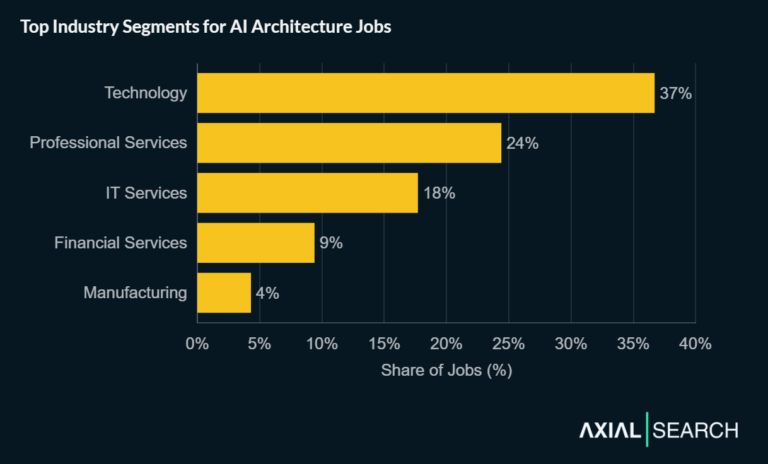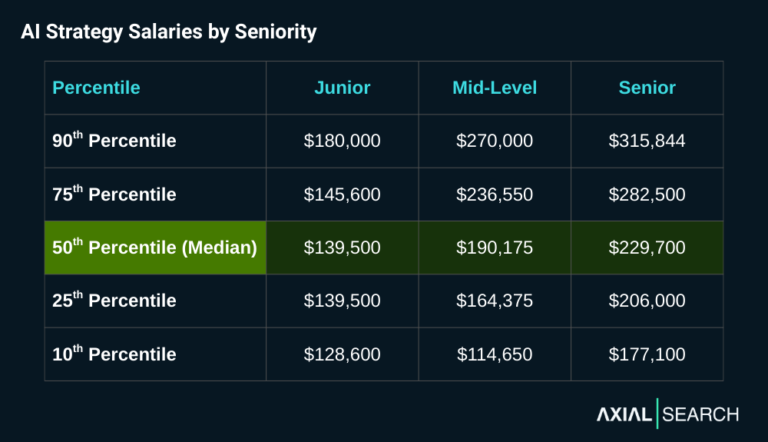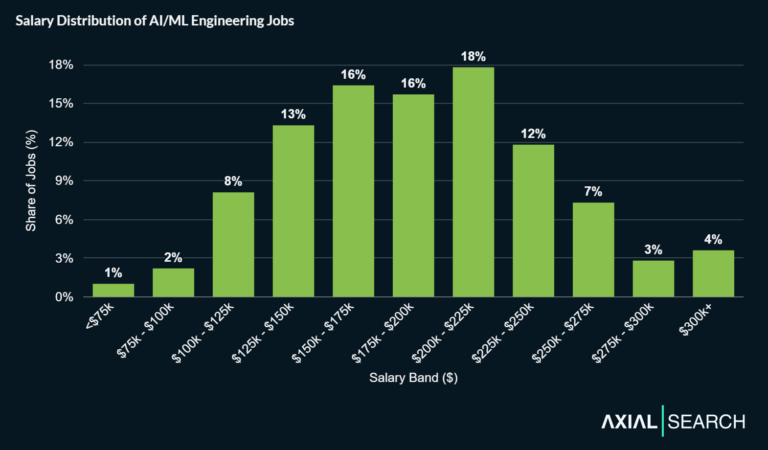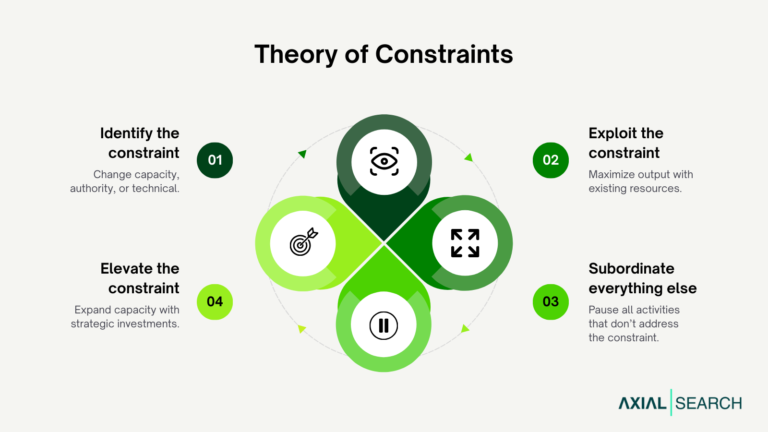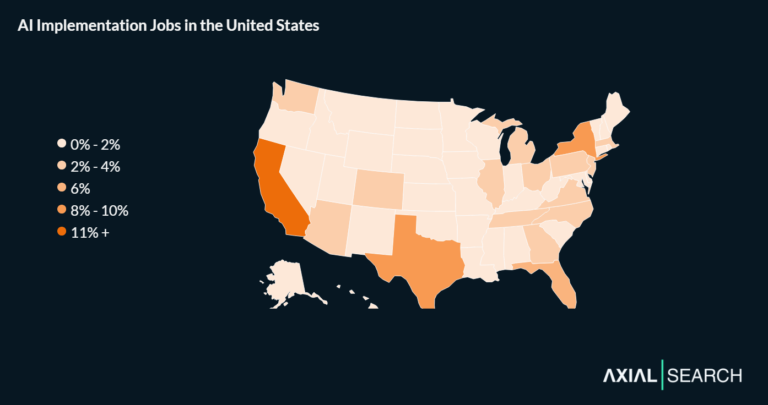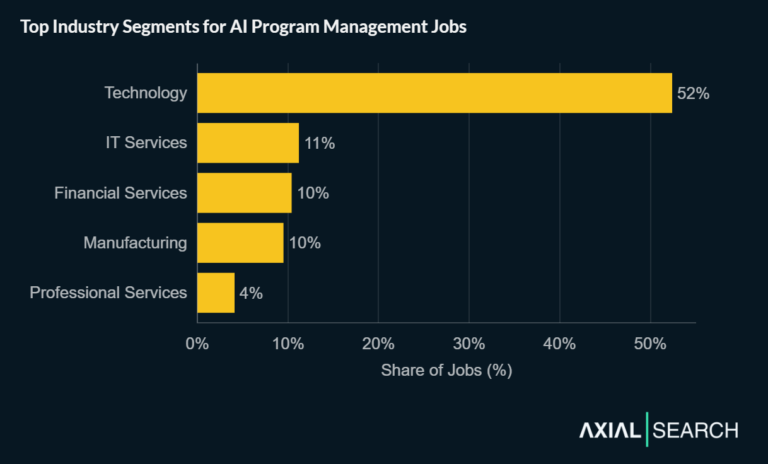Why AI transformation jobs matter
AI transformation roles are becoming central to how organizations compete. More than 75% of companies expect to adopt AI by 2027, yet few have a clear plan for how to turn that investment into measurable impact. AI transformation leaders build that plan. They define where AI can create value, redesign workflows around intelligent systems, and ensure adoption happens safely and effectively across the business.
The evidence of impact is already clear. In a controlled experiment, generative AI cut time spent on professional writing tasks by 59% while improving quality by 18%, easing major content bottlenecks in marketing, sales, and operations. In another large-scale rollout, over 5,000 support agents using a generative AI assistant saw productivity rise by 14% on average, with the greatest gains among less-experienced agents and higher customer satisfaction. These results show how quickly AI can reshape performance when integrated thoughtfully.
AI transformation professionals make this scale possible. They bridge technical innovation and business execution, ensuring AI delivers outcomes that matter—speed, accuracy, and customer value. They align strategy, talent, and governance to embed AI in the core of the enterprise. With their leadership, companies can move from pilots to enterprise-grade adoption. Without it, most will fall behind in an economy increasingly defined by intelligence and automation.
Takeaway: AI transformation jobs address the critical gap between AI’s proven potential and organizational ability to capture value through structured implementation, change management, and governance.
What does an AI transformation leader do day-to-day?
AI transformation leaders coordinate complex, cross-functional initiatives that span technical implementation, regulatory compliance, and organizational change management.
Core responsibilities center on strategic coordination and risk management:
- Regulatory Compliance: Ensure AI initiatives meet evolving regulatory requirements, as the FTC warns companies to ‘keep your AI claims in check’ and substantiate performance claims while avoiding deception and ensuring accountability.
- Third-Party Risk Management: Navigate complex vendor relationships through structured due diligence and ongoing oversight, following interagency guidance for financial institutions to manage third‑party risks across due diligence, contracting, and monitoring when procuring AI models, data, and platforms.
- Process Prioritization: Focus transformation efforts where impact is greatest, as roughly three‑quarters of generative AI’s value potential is concentrated in customer operations, marketing and sales, software engineering, and R&D.
- Industry-Specific Strategy: Tailor approaches to sector dynamics, with McKinsey identifying banking, high tech, life sciences/pharma, retail and consumer packaged goods, advanced manufacturing, telecom/media, and automotive as industries with the biggest generative AI opportunities.
- Risk Framework Implementation: Apply structured risk management through the NIST AI Risk Management Framework’s Govern, Map, Measure, Manage functions to establish policies, map contexts and risks, measure performance, and manage through controls and monitoring.
- Workforce Development: Lead reskilling initiatives to address the reality that 44% of workers’ skills will be disrupted in five years due to technology including AI, making change management and training coordination essential transformation duties.
Takeaway: AI transformation leaders coordinate strategic implementation across compliance, vendor management, process optimization, and workforce development to ensure safe, effective AI adoption at scale.
Where does a head of AI job sit in an org structure?
Head of AI jobs typically sit within enterprise-level governance structures that coordinate across business units while maintaining direct executive accountability.
Organizational placement varies by maturity and scope, but common patterns include:
- Center of Excellence Leadership: BCG recommends setting up a Generative AI Center of Excellence often led by a senior executive to centralize expertise, establish standards, and coordinate business-unit delivery via a hub-and-spoke model.
- Hybrid Centralized-Distributed Model: Organizations capturing the most value from AI tend to centralize enabling capabilities like platform and CoE functions while partnering closely with business domains to scale use cases.
- Cross-Functional Coordination: The NIST AI Risk Management Framework emphasizes that AI risk management requires multidisciplinary participation across executives, risk, legal, compliance, HR, procurement, IT, cybersecurity, data scientists, and domain experts.
- Executive Accountability: The RMF also calls for organizational governance and leadership engagement, assigning roles and accountability for AI outcomes across the enterprise—not just technical teams.
- Board Oversight Integration: The World Economic Forum’s AI governance guidance emphasizes board oversight and clear executive accountability for AI, reinforcing that AI transformation leaders must coordinate enterprise governance and risk controls across functions.
This positioning reflects the strategic nature of AI transformation, requiring influence across technical, business, legal, and risk functions to orchestrate comprehensive change programs.
Takeaway: Head of AI jobs typically operate within centralized governance structures that coordinate enterprise-wide capabilities while partnering with business units, requiring direct executive reporting and cross-functional influence.
Essential skills for AI transformation jobs
AI transformation jobs require a unique blend of technical literacy, business acumen, and change leadership capabilities that span technology implementation and organizational transformation.
Foundational technical competencies include:
- AI Implementation Best Practices: Master clear instructions, role prompting, providing reference text, and iterative testing to improve reliability and integrate LLMs into workflows effectively.
- RAG Architecture: Implement the RAG pattern that integrates embeddings, vector stores, chunking, and retrieval to ground LLMs on enterprise data for accurate, auditable AI answers in operations.
- API Integration: Deploy function calling to enable structured outputs and safe API/Tool invocation by LLMs, a key competency for automating processes and integrating AI with operational systems.
- Data Pipeline Management: Ensure high-quality, relevant, and representative data with documentation and traceability across the data pipeline for reliable AI outcomes in production.
Risk management and compliance capabilities are critical:
- AI Bias Prevention: Meet EEOC guidance requiring employers to ensure AI tools do not cause discrimination, requiring capabilities for validation, disparate impact assessment, and documentation.
- Security Implementation: Apply guidelines covering secure design, threat modeling, supply chain security, model and data protections for AI systems.
- Quality Assurance: Implement human and automated evaluation of accuracy, toxicity, groundedness, and continuous monitoring with feedback loops for production quality and safety.
- Governance Framework Application: Operationalize the NIST AI RMF’s Govern, Map, Measure, and Manage functions requiring practices like documentation, transparency, human oversight, evaluations, and monitoring.
Organizational transformation skills distinguish effective leaders:
- Change Management: Lead employee training, policies, and governance initiatives as organizations advancing with gen AI invest in these capabilities.
- Strategic Scaling: Develop clear strategy, cross-functional operating models, and change management to turn pilots into production impact.
Takeaway: Success in AI transformation jobs requires mastering technical implementation, regulatory compliance, security protocols, and change leadership to bridge the gap between AI potential and organizational execution.
What frameworks guide AI transformation leaders?
AI transformation leaders rely on structured frameworks that provide systematic approaches to governance, risk management, and responsible deployment across enterprise contexts.
Essential governance frameworks include:
- NIST AI Risk Management Framework: A lifecycle framework with four core functions—Govern, Map, Measure, Manage—to systematically identify, assess, prioritize, and mitigate AI risks while aligning AI with organizational objectives.
- ISO/IEC 42001:2024: A management system standard that defines requirements to establish, implement, maintain, and continually improve an AI management system, integrating AI governance with business processes and objectives.
- Microsoft Responsible AI Standard: Operational requirements for responsible AI across the lifecycle including impact assessments, data governance, human oversight, safety, transparency with role/accountability assignments and process controls.
- Deloitte’s AI Ethics Framework: A multi-dimensional framework addressing fairness, transparency, robustness, privacy, safety, accountability with governance controls to operationalize responsible AI across the enterprise.
These frameworks provide complementary approaches to different aspects of AI transformation. NIST offers comprehensive risk management, ISO provides management system integration, Microsoft delivers operational requirements, and Deloitte focuses on ethical dimensions.
Takeaway: Effective AI transformation requires mastering multiple frameworks that address governance, risk management, ethical deployment, and management system integration to ensure responsible, scalable AI adoption.
Which tools are crucial for head of AI strategy roles?
Head of AI strategy roles require proficiency across AI platforms, development frameworks, data infrastructure, and governance tools that enable enterprise-scale deployment and management.
Core AI platform capabilities include:
- OpenAI Platform: APIs for GPT-4o and other models, embeddings, speech, and Assistants to integrate advanced language and multimodal capabilities into applications.
- Google Gemini API: Multimodal models with function calling and tooling to build generative AI applications.
- Anthropic Claude API: Text and tool-use capabilities with streaming and safety features to power enterprise LLM applications.
- Azure AI: Comprehensive AI services with built-in responsible AI practices for content safety, fairness, and transparency.
Development and deployment infrastructure includes:
- LangChain: Framework for building context-aware, agentic applications by composing LLMs with retrieval, tools, and evaluation.
- AWS SageMaker: Fully managed service to build, train, and deploy machine learning models with integrated MLOps for production AI workloads.
- Databricks AI Platform: Platform to build, govern, and serve generative AI and LLM applications on the lakehouse, including vector search and model serving.
Specialized data and automation tools support enterprise deployment:
- Snowflake Cortex: Built-in LLMs, functions, and vector search to create AI experiences securely with existing governance and data.
- Pinecone: Managed vector database for semantic search and RAG at scale with high-performance indexing and retrieval.
- Tecton: Enterprise feature platform to build, manage, and serve ML features for real-time and batch predictions.
- UiPath: End-to-end automation platform with AI-powered RPA, document understanding, and process orchestration.
- Apache Airflow: Platform to programmatically author, schedule, and monitor data/ML workflows for production pipelines.
Takeaway: Head of AI strategy roles require proficiency across AI platforms, development frameworks, data infrastructure, and automation tools to enable secure, scalable enterprise AI deployment and governance.
Qualifications for AI transformation leader roles
AI transformation leader roles typically require advanced educational backgrounds combined with demonstrated experience in technology implementation, business strategy, and organizational change management.
Educational requirements often include bachelor’s degrees in computer science, engineering, business administration, or related technical fields. Many positions prefer master’s degrees in AI/ML, data science, business administration, or organizational psychology. Advanced degrees in emerging fields like AI ethics or digital transformation are increasingly valued.
Professional experience spans multiple domains reflecting the interdisciplinary nature of AI transformation:
- Technology leadership experience in software development, data science, or enterprise architecture
- Business strategy or consulting experience with large-scale transformation programs
- Project or program management experience leading cross-functional initiatives
- Risk management or compliance experience, particularly in regulated industries
- Change management experience with workforce development and organizational transformation
Industry-specific knowledge enhances qualification strength. Financial services values understanding of regulatory frameworks and risk management. Healthcare requires familiarity with clinical workflows and patient safety protocols. Manufacturing seeks experience with operational technology and industrial automation.
Leadership capabilities are universally critical, including stakeholder management across technical and business functions, executive communication and presentation skills, and ability to translate complex technical concepts for business audiences.
Takeaway: AI transformation leader roles require advanced education, cross-functional experience spanning technology and business domains, plus demonstrated leadership capabilities to coordinate complex, enterprise-scale change initiatives.
What certifications are important for AI transformation jobs?
Professional certifications demonstrate expertise across technical implementation, governance frameworks, and program management capabilities that are essential for AI transformation leadership.
Core AI and cloud certifications include:
- AWS Certified AI Practitioner: Entry-level validation of AI/ML and generative AI fundamentals on AWS for stakeholders driving AI adoption and business outcomes.
- Google Cloud Professional Machine Learning Engineer: Certifies capability to build and operationalize ML models, ensure scalability and reliability, and drive business impact on Google Cloud.
- Google Cloud Professional AI Engineer: Validates skills to design, build, and productionize AI solutions using Google Cloud tools with focus on generative AI.
- Microsoft Azure AI Responsible AI: Verifies hands-on ability to apply responsible AI practices including content safety, fairness, and transparency when building solutions.
Governance and risk management credentials address compliance requirements:
- IAPP Certified Artificial Intelligence Governance Professional (AIGP): Validates ability to design and implement AI governance programs that manage risk, ensure accountability, and support compliant AI adoption across the enterprise.
- PECB ISO/IEC 42001 Lead Implementer: Credential to establish, implement, maintain, and continually improve an AI Management System aligned to ISO/IEC 42001:2024 for governing AI in organizations.
Program management certifications support transformation leadership:
- PMP (Project Management Professional): Global standard for leading complex initiatives, aligning stakeholders, managing risk, and delivering outcomes—key for AI transformation programs.
Takeaway: AI transformation professionals benefit from combining technical certifications in AI/ML platforms with governance credentials and program management qualifications to demonstrate comprehensive transformation leadership capabilities.
Career progression in AI transformation jobs
AI transformation careers offer diverse pathways with opportunities to advance through technical specialization, strategic leadership, or cross-functional coordination as organizations mature their AI capabilities.
Typical progression follows increased scope and strategic responsibility:
- AI Analyst/Specialist: Entry-level roles supporting specific AI initiatives or business units
- AI Program Manager: Mid-level positions coordinating cross-functional AI workstreams
- Senior AI Transformation Manager: Experienced practitioners leading enterprise-wide initiatives
- Director of AI Strategy: Leadership roles overseeing AI governance and portfolio management
- Chief AI Officer: Executive positions leading organization-wide AI transformation strategy
Entry pathways reflect the interdisciplinary nature of AI transformation. The NIST AI RMF emphasizes that effective AI programs require coordination among technical, business, risk, and legal roles across the AI lifecycle, indicating typical entry paths from these functions. Product managers focused on AI are recognized roles that guide AI integration by aligning user needs, business outcomes, and model capabilities.
Market demand concentrates in specific sectors. AI job postings requiring AI skills are most concentrated in information and communication, professional services, and financial services, signaling robust hiring demand. In the U.S., AI job postings are heavily represented in professional, scientific and technical services; information; manufacturing; and finance and insurance.
Organizational evolution creates new leadership opportunities. High-performing organizations centralize AI through Centers of Excellence to set standards, governance, and platforms, creating program-lead roles that often evolve into enterprise AI transformation leadership. The trend toward combined executive roles is evident as industry adopts titles like Chief Data & AI Officer, with companies like GE HealthCare appointing their first Chief Data and Artificial Intelligence Officer.
Formal recognition of AI leadership continues expanding. The OMB mandates a Chief AI Officer in each U.S. federal agency to coordinate AI use, formalizing the CAIO title as a primary AI transformation role.
Takeaway: AI transformation careers progress from specialist roles to executive leadership positions, with entry pathways from technical, business, risk, and product functions as organizations formalize AI governance and transformation capabilities.
Which associations benefit AI transformation professionals?
Professional associations provide essential networking, education, and thought leadership that advance AI transformation careers while keeping practitioners current with rapidly evolving best practices.
Core AI and technology associations include:
- Association for the Advancement of Artificial Intelligence (AAAI): Flagship AI society connecting research and practice; a hub for developments that inform applied AI and enterprise adoption strategies.
- Institute of Electrical and Electronics Engineers (IEEE): Global engineering and standards association uniting practitioners across computing, automation, and systems—central disciplines for operationalizing AI at scale in enterprises.
- Linux Foundation AI & Data: Open-source foundation that hosts AI and data projects and communities leveraged by enterprises building production-grade AI systems.
Governance and responsible AI organizations address compliance requirements:
- Responsible AI Institute: Membership nonprofit focused on responsible AI frameworks and certifications to help enterprises operationalize trustworthy AI across functions.
- Partnership on AI: Multi-stakeholder industry body advancing responsible AI practices and resources that support trustworthy AI deployment in real-world organizations.
- ISACA: Global association for IT governance, risk, security, and audit—key for managing AI risks, compliance, and control frameworks in enterprise AI transformation.
Takeaway: Active participation in associations spanning technical AI development, responsible AI governance, and IT risk management provides comprehensive professional development for AI transformation leadership roles.
What are the top events for AI transformation leaders?
Leading conferences provide strategic insights, networking opportunities, and exposure to emerging practices that accelerate AI transformation leadership development.
Premier enterprise AI events include:
- NVIDIA GTC: Flagship AI conference for enterprises scaling AI/GenAI, featuring keynotes, industry use cases, MLOps, and AI infrastructure tracks.
- Databricks Data + AI Summit: Large-scale event on data engineering, governance, and enterprise AI/LLM deployment for business transformation on the data lakehouse.
- AI World Summit: Global gathering of AI leaders and enterprises covering strategy, ethics, GenAI, and practical deployment at scale.
Major cloud and technology conferences offer comprehensive AI content:
- AWS re:Invent: Premier cloud conference with extensive content on building, operationalizing, and governing AI/ML and GenAI at enterprise scale.
- Google Cloud Next: Enterprise-focused conference highlighting applied AI, data cloud, Vertex AI, and real-world AI transformation case studies.
- Microsoft Ignite: Event for IT leaders and practitioners on AI transformation across Microsoft cloud, including Copilot, Azure AI, and governance.
Industry-specific events provide targeted insights:
- The AI Summit: Industry event focused on commercial AI adoption, enterprise case studies, and operating models to embed AI across the business.
- Gartner Data & Analytics Summit: Analyst-led summit for CDOs and AI leaders on data strategy, analytics, GenAI adoption, and scaling AI for business outcomes.
Takeaway: Regular attendance at enterprise AI conferences like NVIDIA GTC and cloud platform events provides essential strategic insights, case studies, and networking opportunities for AI transformation leadership development.
Compensation for AI transformation jobs
AI transformation jobs command premium compensation reflecting the strategic importance and specialized skills required for successful enterprise AI implementation.
Base salary ranges vary significantly by experience level and market:
- AI Transformation Manager total pay: $233K – $393K/yr with $300K/yr median: Pay breakdown includes $150K – $239K/yr base pay and $83K – $155K/yr additional pay through bonuses and equity.
- Director-Level Positions: Generative AI Transformation postings at Big Four consulting firms frequently show base pay bands into the mid-$200Ks in high-cost markets, plus performance bonuses and equity participation.
Total compensation packages extend beyond base salary through multiple components. Additional pay typically includes performance bonuses tied to transformation milestones, equity participation in technology companies, and project completion incentives in consulting environments.
Geographic and industry factors significantly impact compensation levels. Major technology hubs like San Francisco, Seattle, and New York typically offer 20-30% premiums over national averages. Financial services, technology, and consulting generally provide the highest compensation packages, while healthcare and government sectors may offer lower cash compensation but enhanced benefits and job security.
Experience and specialization command compensation premiums. Leaders with proven track records in large-scale AI deployments, regulatory compliance experience, and industry-specific expertise often negotiate above-market compensation packages. Certifications in AI governance, cloud platforms, and program management can increase earning potential by 10-15%.
Takeaway: AI transformation jobs offer competitive compensation with median total pay in the $300K range for management roles, including substantial additional pay through bonuses and equity that reflect the strategic value of successful AI implementation.
Final thoughts
AI transformation jobs represent one of the most critical and lucrative career paths in today’s rapidly evolving business landscape. As organizations struggle to bridge the gap between AI’s massive potential and practical implementation, skilled professionals who can navigate technical complexity, regulatory requirements, and organizational change will continue commanding premium compensation and advancement opportunities. Whether transitioning from technology, consulting, or business roles, the combination of technical literacy, governance expertise, and change leadership makes AI transformation a career that delivers both exceptional earning potential and meaningful business impact.


